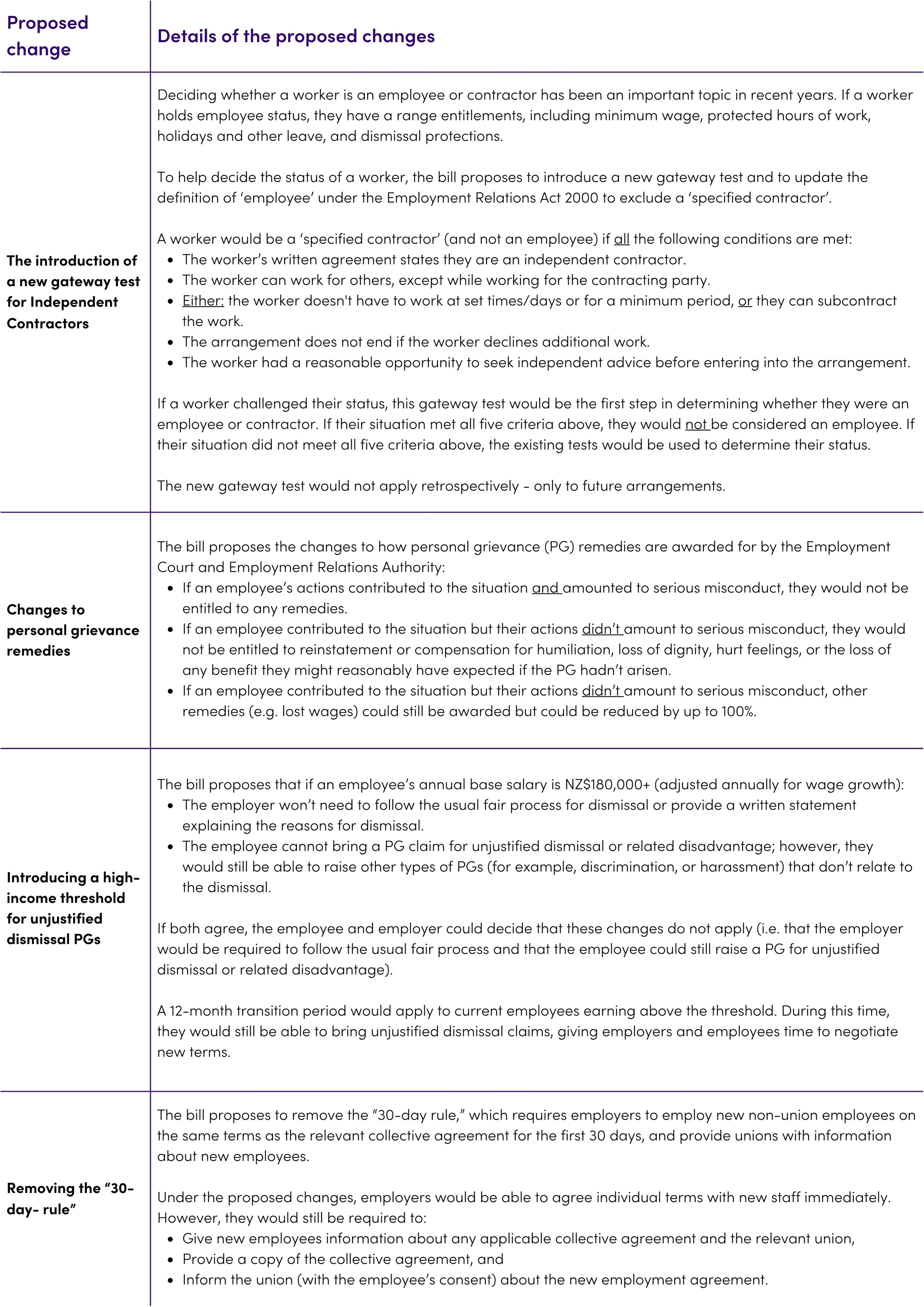Employment Law is Shifting. Here’s What Leaders Need to Know
In April 2025, we shared an article that explored proposed changes to New Zealand’s employment laws. Since then, things have progressed, and many employers are watching news headlines and wondering about the potential impact on their workplaces. In this article, we share:
- a snapshot of recent updates;
- what to expect in the coming months; and
- how you can prepare.
Key update - Introduction of the Employment Relations Amendment Bill
In June 2025, the Government introduced the Employment Relations Amendment Bill (the bill). If this bill is passed in its current form, it will bring significant changes to New Zealand’s employment landscape.
Based on the bill’s current wording, the proposed changes are:

What’s changing now?
Nothing changes yet - the bill was introduced to Parliament and voted forward at its first reading. It is now being examined in detail by a select committee, with submissions being sought from the public until 13 August 2025. The proposed changes are contentious, so we anticipate there will be a lot of submissions, particularly from unions and workers who may see the proposed changes as weakening long-standing protections.
After the committee reports back, the bill will need to go through two more votes (the second and third readings) and debate before it can become law.
If passed in their current form, these changes would be significant, so we encourage you to consider what they would mean for your businesses and to reach out to the team at Humankind if you have any questions. You can read more about how you can prepare in this article.
Other proposed changes
Protected exit negotiations - watch this space
The Employment Relations (Termination of Employment by Agreement) Amendment Bill is at the select committee stage after passing its first reading (public submissions on the bill have now closed). If passed, this bill would allow an employer to offer an employee a specified payment to agree to end their employment relationship, without this conversation itself becoming grounds for a personal grievance (provided certain conditions were met).
Under current law, employers and employees can already negotiate exit agreements, but these generally arise from disputes or grievances - offering an exit settlement without a dispute can give rise to a constructive dismissal claim.
Disclosing remuneration - watch this space
The Employment Relations (Employee Remuneration Disclosure) Amendment Bill has passed its second reading and is likely to become law. This bill proposes to prevent employers from penalising workers who discuss or disclose their own pay to others. Employers can still include pay confidentiality terms in contracts, but these clauses would not be enforceable.
Privacy changes – watch this space
A new Information privacy principle (IPP3A) is expected to take effect in May 2026. Currently, organisations don’t have to tell people when they collect their personal information from other sources (third parties). As a result, people often don’t know who holds or uses their information. Under IPP3A, if an organisation collects personal information indirectly, it must tell the person certain details — for example, what information is collected and why. There will be some limited exceptions. Organisations will need to update their privacy policies and put systems in place to notify people when collecting information indirectly. This bill is awaiting its third reading.
Health and safety changes – watch this space
As outlined in our article from April 2025, the Government has made several announcements regarding these changes and has indicated it will share draft legislation this year with a view to see changes coming into force in 2026. We have yet to see any significant changes at this time.
A wrap up of other recent changes
Wage theft is now a crime
Effective March 2025, an employer withholding wages without justification is now automatically treated as wage theft and is criminally prosecutable.
Access to employment agreements
Effective 30 April 2025, all employers must ensure employment agreements are ‘readily accessible’ - employers must retain a copy, not just rely on employees’ copies. If an employee requests a copy of their agreement, their employer must provide it within seven working days.
Pay equity – new thresholds
In May 2025, the Pay Equity Amendment Act passed, tightening the criteria for bringing pay equity claims. Workforces must show a sustained gender imbalance (70% female over 10 years) to pursue a claim. Any current claims not meeting the new bar must start again.
Minimum wage increases
From June/July 2025, the adult minimum wage rose from $23.15 to $23.50, with training and starting-out rates increasing accordingly.
KiwiSaver changes
In June 2025, the Government announced several changes to KiwiSaver. From 1 July 2025:
- The maximum government contribution dropped from $521.43 to $260.72.
- 16 or 17-year-olds now qualify for government contributions if they meet eligibility requirements.
- Employees earning over $180,000 a year will no longer qualify for government contributions.
From 1 July 2026, the default KiwiSaver contribution rate will rise to 3.5% (from 3%) for employees and employers.
It’s a lot to keep up with so the team at Humankind are watching for updates closely and will keep you up to date with any changes. In the meantime, if you’d like to discuss how these changes could affect your workplace and how you can prepare for changes, please reach out.



